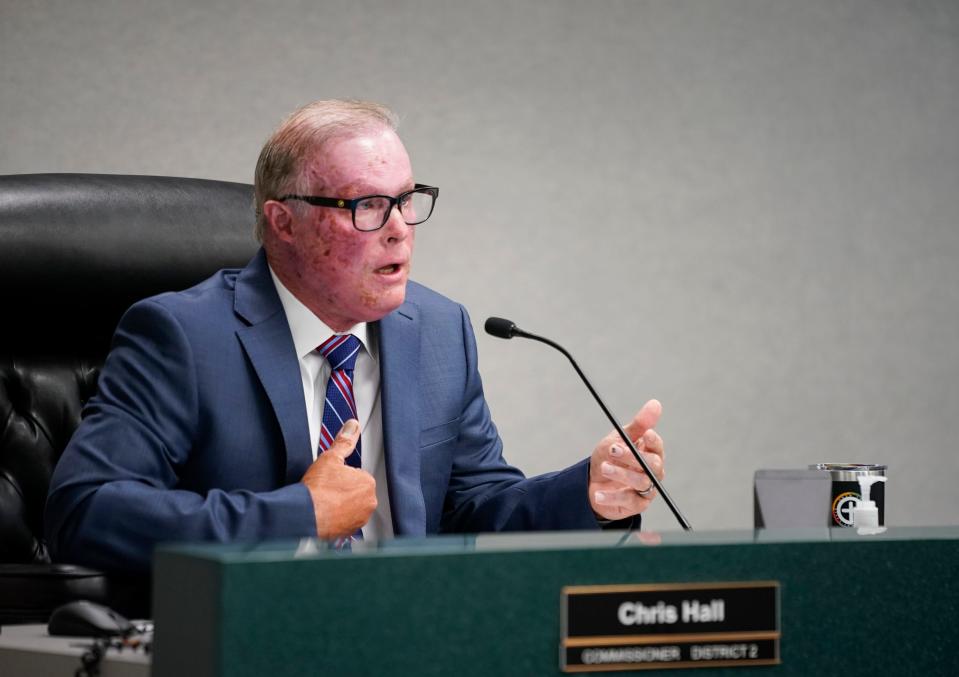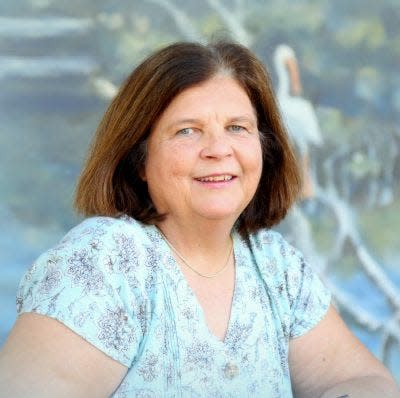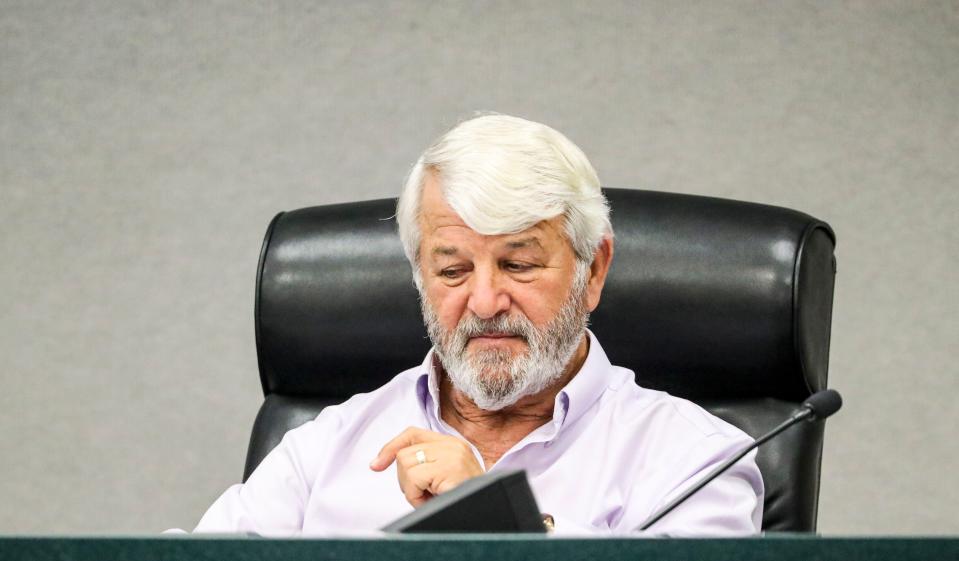Collier commissioner Hall revives controversial 'Bill of Rights sanctuary' declaration
Commissioner Chris Hall has revived a controversial proposal to establish Collier County as a "Bill of Rights sanctuary."
A similar effort failed by a vote of 3-2 in 2021.
At the time, Hall wasn't on the county commission. He took office in December.
While his ordinance didn't appear on the agenda Tuesday, word had already spread – and a handful of residents showed up at the meeting, to oppose it. They spoke during public comments.
The ordinance had already been advertised for the board's next meeting, but some commissioners didn't know about it, until public speakers lined up against it.
It now will be taken up in August, at the request of Commissioner Burt Saunders, who told the board he couldn't make the next two meetings, and he wanted to be part of the discussion – and decision.
Saunders rejected the idea last time.
Just like the original one, the revived ordinance states the board of county commissioners has "growing concerns over the federal government's increasing encroachment on the rights and privileges of its citizens," and cites executive orders in particular.
It proclaims the county has the "right to be free from the commanding hand of the federalgovernment and has the right to refuse to cooperate with federal government officials in response to unconstitutional federal government measures."

While Hall didn't go into detail about the proposal at the meeting, he discussed it generally, saying that when he ran for office he did so to ensure and protect the rights of the people, and that's the purpose behind it.
"We don't want to do any more than that," he said.
He and his backers aren't looking to do anything other than to live "happily ever after," he added, but want a measure in place that the sheriff can enforce "just in case anything happens."
From our archives: Collier Commission rejects Bill of Rights sanctuary county law, opts for resolution
More like this: Collier leaders pass 'health freedom' ordinance to protect individual liberties
What would the ordinance do?
The ordinance defines "any federal act, law, order, rule, or regulation, which violates or unreasonably restricts, impedes, or impinges upon" a person's Constitutional rights" as unlawful, making any such act "null, void and of no effect in Collier County."
It would prohibit any "agent, department, employee or official of Collier County," from enforcing or investigating any activity relating to the unlawful act. Violators could be sued in Circuit Court and punished under county code.
As proposed, if the ordinance should conflict with any other laws, the most restrictive rules would apply, and should the court overturn sections of it, the rest of it would remain in effect.
"I'm sure we are going to hear a million comments," Hall told his fellow commissioners.
He joked about getting his "flame suit" on, in preparation for all the negative comments he expects to hear over the coming weeks, through emails, letter and phone calls, and at the public hearing itself.
Commission Chairman Rick LoCastro relaxed the rules to allow speakers to address the issue at Tuesday's meeting, during general comments. During that time, public comment is usually restricted to items not on the current agenda, or future ones.
Critics argued the ordinance was illegal, and would result in chaos, the same as they did the first time around. They raised concerns about the unintended consequences that could hurt residents, businesses and the county itself – from jeopardizing federal dollars for hurricane relief to chasing away visitors.
No need to 'repeat history'
"We don't have a need to repeat history," said David Silverberg, a county resident, who blogs as The Paradise Progressive, reporting on and closely following local political news.
It should be clear, he said, that a majority of residents have a "deep concern" about the proposal. He contended it had already been fully argued, and rejected, as unconstitutional and unviable, and shown to be of a great detriment to the county.
"The sanctuary for the Bill of Rights is the United States of America," Silverberg said. "It's the only sanctuary, full stop. We don't need some sort of secession."
Jane Schlechtweg, chairwoman of the Collier County Democratic Party, agreed.
She hoped cooler heads would prevail, so "we can put all of this behind us."
"There are legal mechanisms in place if you do not like a federal law, as seen by the recent Supreme Court rulings on affirmative action and student loans, to name a few," she said.

Susan Cone, a longtime resident, spoke against the ordinance, too, as she did the first time. She fretted about the economic consequences, and the confusion she expects it to cause.
She reiterated there are other ways to deal with the issue of oppressive federal laws, through court challenges and at the ballot box.
"We don't just say, 'I don't like this law, and I don't want to follow it," Cone said.
A 'lawless' county?
Todd Truax, a nursing home administrator in Naples, asked if the aim was to create a "lawless county," suggesting that would be the result of the proposal. He questioned whether his center would no longer have to follow the rules required of it by the Centers for Medicare & Medicaid Services.
He told commissioners to stick with doing the less glamorous, but more necessary work of tending to roads, drains, utilities, bridges and dumps to provide the services county residents need.
He hoped commissioners would "bury" the proposal and stop trying to "own the libs."
In his eyes, he said, the ordinance seemed to target "people of color" and other protected classes.
"It reads like a hate speech under the guise of a dusty proclamation," Truax said.
Other opponents pointed to the ordinance's potential effects on gun safety laws, and public safety in general, and on the county's budget and taxpayers, if it results in more lawsuits brought against elected officials, or other employees, who are found in violation.
Violators could be sued for declaratory and injunctive relief, damages and attorneys’ fees.
Collier County Attorney Jeffrey Klatzkow raised concerns about the legal ramifications of the ordinance when it was proposed the first time.
Back then, he stated: "The big issue here is not going to be damages. It's going to be attorneys' fees. There is an incentive for attorneys to bring actions under this because every hour they put in is an hour they can bill."
A 'lot of hyperbole'
Only one supporter spoke in favor of the proposal at the meeting.
Kristina Heuser, a practicing attorney in New York, who helped craft the original ordinance, which looks much the new one, said she decided to attend the meeting after hearing the issue may came up. Although she hadn't planned to speak, preferring to wait until the public hearing, she felt compelled to do so, in response to the "many inaccuracies" stated by opponents, she said.
"It's a lot of hyperbole. And fear mongering," Heuser said.
She told commissioners the ordinance is much narrower in scope than the "picture that has been painted" here.
"The ordinance makes it unlawful for the county to help the federal government in carrying out or executing unlawful, unconstitutional mandates of the federal government," Heuser said.
She added it wouldn't nullify federal law, "willy-nilly," nor would it mean the county would no longer abide by federal law. More specifically, it states that county employees and officials can't carry out or enforce unconstitutional mandates or orders by the federal government, Heuser said.
"This rests soundly on well-settled law," she said. "It's called the anti-commandeering principle, or doctrine, and it has been upheld by the Supreme Court, over and over and over again."
That's why, she said, other state and local governments have been successful in becoming sanctuaries from the federal gun and immigration laws. She pointed out that more than half of the counties in the United States are now so-called Second Amendment sanctuaries.
"So, this concept has been tested elsewhere and upheld every single time by the courts," Heuser said.
An issue of timing
A few months ago, county commissioners agreed to continue meeting and working through the summer, when they usually take a hiatus. However, their intention appeared to be not to vote on any big issues, at least in the area of land use and development.
Opponents argued if the commission planned to vote on something so controversial as the Bill of Rights sanctuary they shouldn't do it in the "dead of summer," when so many county residents are traveling, or up north, where they have other homes.
Hall seemed intent on having it heard in two weeks, pointing out that residents can still voice their concerns through email, letters and phone calls, and watch meetings online, with the ability to make comments via Zoom, remotely.
"I want to work. I don't want to play. I don't want to play babysitter to the agenda items," he said.
A change of heart
Hall changed his mind after Saunders asked him for a personal point of privilege to allow him to be part of the discussion and decision. He reminded Hall of his mantra of treating others like he would want to be treated, which has proven persuasive in other board decisions.
"There is no real emergency," Saunders pointed out, with Congress heading into its August recess.
The longtime commissioner did not share why he would have to miss the meetings.

While he had "things in motion," Hall said he could reposition them for Saunders.
"I would rather you be here," he said. "I just didn't know you wouldn't be here."
Other commissioners supported Saunders' request to move the hearing to the second week of August, when he'll be back.
"I can tell you it's going to be big and contentious," Chairman Rick LoCastro warned.
Last time, more than 100 residents signed up to speak on the ordinance before commissioners made their final decision to reject it. Public comment became heated at times, and the hearing ran for hours.
Back then, Penny Taylor and Andy Solis, who are no longer in office, voted against the ordinance, along with Saunders.
The two supporters are still on the board, LoCastro and Bill McDaniel.
After the first vote, Taylor introduced a resolution reaffirming the county's allegiance to the country and the Bill of Rights. The resolution passed unanimously.
The resolution states: “The county commission of Collier County, Florida, reaffirms its loyalty, its patriotism and its allegiance to the United States Constitution, its Bill of Rights, its amendments and the duly constituted laws."
This article originally appeared on Naples Daily News: Collier commissioner Hall revives 'Bill of Rights sanctuary' ordinance

